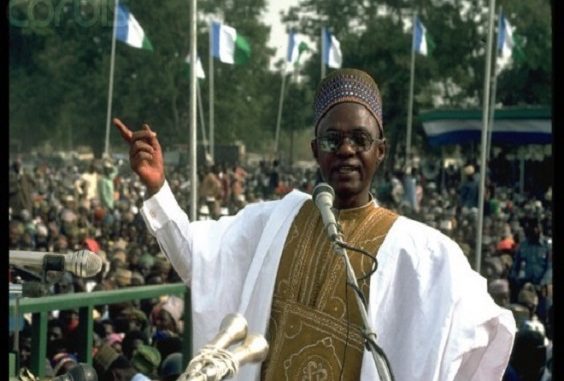
1. Born in Shagari Village
Shagari was born in the northern Shagari village founded by his great-grandfather, Ahmad Rufa’i, who was also the Village Head and took the name Shagari as his family name.
2. Veteran Lawmaker, Minister and Commissioner
In 1954, Shagari was elected into his first public office as a member of the federal House of Representative for Sokoto west at the age of 29.
With his great wealth of experience in service, Shagari served seven times in a ministerial or cabinet post as a federal minister and as federal commissioner from 1958–1975.
3. Man of Multiple Traditional Titles
In 1962, Shagari was made the Turaki of the Sokoto Caliphate by the then Sultan of Sokoto Siddiq Abubakar III. Turaki is a title which translates to the officer at court, referring to the sultan’s court at the palace of Sokoto.
Beyond the Northwest, Shagari also holds the chieftaincy titles of the Ochiebuzo of Ogbaland, the Ezediale of Aboucha and the Baba Korede of Ado Ekiti.
4. The Teacher
Shehu Shagari matriculated at the Teachers Training College, in Zaria, Kaduna, in 1944
He got a job as a visiting teacher at Sokoto Province even as a federal lawmaker between 1953 and 1958.
5. Founding Member of the National Peoples Party
Shehu Shagari was a founding member of the National People’s Party in 1978.
In 1979, he was chosen by the party as the presidential candidate for a general election that year, which he won becoming the president and head of state of the Federal Republic of Nigeria.
Shagari ran for a second four-year term in 1983 and won the general election.
6. Overthrown By Major General Muhammadu Buhari
Shagari won the 1979 election with the help of his campaign manager, Umaru Dikko.
The campaign had the support of many prominent politicians in the North and among southern minorities.
The party’s motto was “One Nation, One Destiny” and was seen as the party best representing Nigeria’s diversity.
However, on 31 December 1983, Shagari was overthrown by Major General Muhammadu Buhari.
7. Reformer of agricultural, industrial and oil sectors
Shagari is reported to have made Housing, Industries, Transportation and Agriculture as the major goals of his administration during the oil boom between 1979 and 1983.
In transportation, he launched some road networks across the country and initiated a program to foster the use of mechanical machinery in farming. It favored large-scale farmers in order to produce mass products.
Shagari’s government also embarked on a “Green Revolution”, distributing seed and fertilizer to farmers to increase nationwide productivity in farming.
He is also credited with creating a low-cost housing scheme.
With the oil revenue, Shagari finished building the Kaduna refinery in 1980 which started operations same year.
Also with the oil revenue, Shagari concluded the construction of an additional steel plant and three rolling mills at Ajaokuta, Nigeria.
Shagari completed the Delta Steel complex in 1982.
In 1983 he created the Aluminum Smelter Company of Nigeria at Ikot Abasi, Nigeria.
However, Shagari reduced the share of oil royalties and rents to state of origin from 30 to 2 percent.
8. Married three wives and had many Children
Shagari married three wives: Amina, Aishatu, Hadiza Shagari. He has many children.
However, his most visible children are former Minister of Water Resources and Deputy-Governor of Sokoto state, Mukhtar Shagari. Others are Captain Muhammad Bala Shagari (retd) and Aminu Shehu Shagari.
On 24 August 2001, his wife, Aisha Shagari, died in a London hospital from a brief illness.
